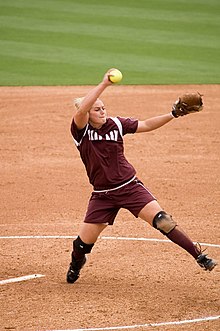
Softball is a popular variation of baseball, the difference being that it is played with a larger ball on a smaller field and with only underhand pitches permitted. Softball is played competitively at club levels, the college level, and the professional level. The game was first created in 1887 in Chicago by George Hancock.

In baseball, the pitcher is the player who throws ("pitches") the baseball from the pitcher's mound toward the catcher to begin each play, with the goal of retiring a batter, who attempts to either make contact with the pitched ball or draw a walk. In the numbering system used to record defensive plays, the pitcher is assigned the number 1. The pitcher is often considered the most important player on the defensive side of the game, and as such is situated at the right end of the defensive spectrum. There are many different types of pitchers, such as the starting pitcher, relief pitcher, middle reliever, lefty specialist, setup man, and the closer.
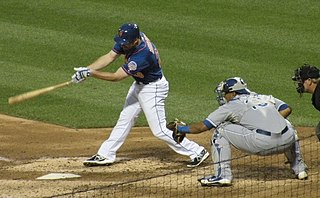
Catcher is a position in baseball and softball. When a batter takes their turn to hit, the catcher crouches behind home plate, in front of the (home) umpire, and receives the ball from the pitcher. In addition to this primary duty, the catcher is also called upon to master many other skills in order to field the position well. The role of the catcher is similar to that of the wicket-keeper in cricket.

The fastball is the most common type of pitch thrown by pitchers in baseball and softball. Its distinctive feature is its high speed. "Power pitchers," such as former American major leaguers Nolan Ryan and Roger Clemens, rely the speed of the fastball to prevent the ball from being hit and throw fastballs at speeds of 95–105 miles per hour (153–169 km/h) (officially) and up to 108.1 miles per hour (174.0 km/h) (unofficially). As an alternative to the fastball, pitchers can put movement on slower thrown balls, or throw them towards the inside or outside of home plate where batters cannot easily reach it.

In baseball and softball, the curveball is a type of pitch thrown with a characteristic grip and hand movement that imparts forward spin to the ball, causing it to dive as it approaches the plate. Varieties of curveball include the 12–6 curveball, power curveball, and the knuckle curve. Its close relatives are the slider and the slurve. The "curve" of the ball varies from pitcher to pitcher.

A changeup is a type of pitch in baseball and fastpitch softball.

In baseball, the pitch is the act of throwing the baseball toward home plate to start a play. The term comes from the Knickerbocker Rules. Originally, the ball had to be thrown underhand, much like "pitching in horseshoes". Overhand pitching was not allowed in baseball until 1884.

A four-seam fastball, also called a rising fastball, a four-seamer, or a cross-seam fastball, is a pitch in baseball. It is a member of the fastball family of pitches and is usually the fastest ball thrown by a pitcher. It is called what it is because with every rotation of the ball as it is thrown, four seams come into view. A few pitchers at the major league level can sometimes reach a pitch speed of over 100 mph. It is often compared with the two-seam fastball.

In baseball and softball, the count refers to the number of balls and strikes a batter has in their current plate appearance. If the count reaches three strikes, the batter strikes out; if the count reaches four balls, the batter earns a base on balls.

In baseball, a submarine is a pitch in which the ball is released often just above the ground, but not underhanded, with the torso bent at a right angle, and shoulders tilted so severely that they rotate around a nearly horizontal axis. This is in stark contrast to the underhand softball pitch in which the torso remains upright, the shoulders are level, and the hips do not rotate.
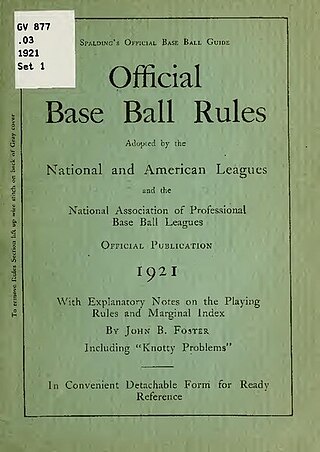
Throughout the history of baseball, the rules have frequently changed as the game continues to evolve. A few common rules most professional leagues have in common is that four balls is a base on balls, three strikes is a strikeout, and three outs end a half-inning.

In baseball, batting is the act of facing the opposing pitcher and trying to produce offense for one's team. A batter or hitter is a person whose turn it is to face the pitcher. The three main goals of batters are to become a baserunner, to drive runners home or to advance runners along the bases for others to drive home, but the techniques and strategies they use to do so vary. Hitting uses a motion that is virtually unique to baseball and its fellow bat-and-ball sports, one that is rarely used in other sports. Hitting is unique because it involves rotating in the horizontal plane of movement, unlike most sports movements which occur in the vertical plane.

James Creighton, Jr. was an American baseball player during the game's amateur era, and is considered by historians to be the sport's first superstar and one of its earliest paid competitors. In 1860 and 1862 he played for one of the most dominant teams of the era, the Excelsior of Brooklyn. He also was reputed to be a superb cricketer, and played in many amateur and professional cricket matches.

In baseball, a pickoff is an act by a pitcher or catcher, throwing a live ball to a fielder so that the fielder can tag out a baserunner who is either leading off or about to begin stealing the next base.
The shuuto (シュート) or shootball is a baseball pitch. It is commonly thrown by right-handed Japanese pitchers such as Hiroki Kuroda, Noboru Akiyama, Kenjiro Kawasaki, Daisuke Matsuzaka, Yu Darvish and Masumi Kuwata. The most renowned shuuto pitcher in history was Masaji Hiramatsu, whose famous pitch was dubbed the razorshuuto because it seemed to "cut the air" when thrown.

In baseball, sidearm is a motion for throwing a ball along a low, approximately horizontal plane rather than a high, mostly vertical plane (overhand).
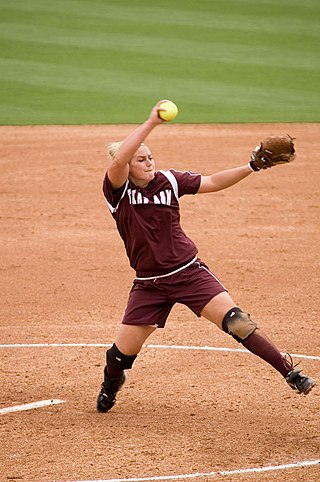
Fastpitch softball, or simply fastpitch, is a form of softball played by both women and men. While the teams are most often segregated by sex, coed fast-pitch leagues also exist. Considered the most competitive form of softball, fastpitch is the format played at the Olympic Games. Softball was on the International Olympic Committee (IOC) program in 1996, 2000, 2004, 2008, and 2020. It will not be a part of the 2024 Summer Olympic Games in Paris.
This is an alphabetical list of selected unofficial and specialized terms, phrases, and other jargon used in baseball, along with their definitions, including illustrative examples for many entries.
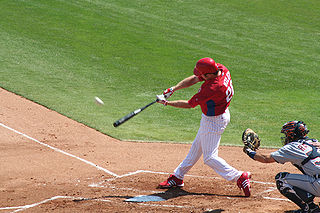
In baseball, hitting mechanics studies the biomechanical motion that governs the swing of a baseball player. The goal of biomechanics in hitting during baseball training is to study and improve upon the physics involved in hitting. This includes optimizing a player's swing for either maximizing their "bat speed" or time for plate coverage. There is a wide range of batting stances and mechanics that are developed through individual preferences. However, when comparing among experienced baseball players, their batting mechanics approach are almost similar.

In sports, the term diamond sports refers to recreational variants of baseball, a bat-and-ball sport. The most popular and closely related sport to baseball is softball, with the two sports being administered internationally by the World Baseball Softball Confederation, alongside Baseball5.
